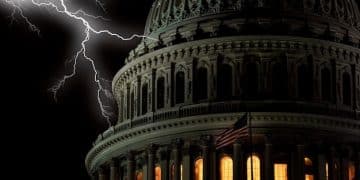New Funding Approved for National Parks and Conservation Efforts

New Legislation: Congress Approves Funding for National Parks and Conservation Efforts, earmarking substantial resources for the upkeep, expansion, and conservation of national parks, and promoting broader environmental stewardship across the United States.
The recent congressional approval of funding for national parks and conservation efforts marks a significant turning point for environmental protection in the United States. This new legislation: Congress Approves Funding for National Parks and Conservation Efforts promises to rejuvenate the country’s natural treasures and fortify its commitment to environmental sustainability.
Understanding the New Legislation
The new legislation aims to provide dedicated funding streams for the maintenance and improvement of national parks and conservation areas. This commitment reflects a bipartisan desire to protect America’s natural heritage and ensure it remains accessible for future generations.
Key Provisions of the Act
The legislation encompasses several key provisions, each designed to address specific needs within the national park system and broader conservation landscape. These provisions include:
- Funding for infrastructure improvements, such as repairing roads, trails, and visitor centers.
- Support for conservation programs, including habitat restoration and species protection.
- Grants for state and local conservation initiatives, promoting collaboration across different levels of government.
- Enhanced educational programs to raise awareness about environmental stewardship.

The injection of funds into infrastructure will address critical needs that have long been neglected. This renewal is essential for ensuring both the safety and enjoyment of visitors, as well as the preservation of park resources. Conservation efforts, supported by the legislation, are critical for maintaining biodiversity and ecological integrity.
The Impact on National Parks
The allocation of funds will have a wide-ranging impact on national parks across the country. From improving visitor facilities to bolstering conservation initiatives, the benefits of this legislation are set to revitalize these cherished spaces.
Enhancing Visitor Experiences
The legislation prioritizes enhancements to visitor experiences in national parks. These improvements will create a more welcoming and enjoyable environment for visitors of all ages and abilities, fostering a deeper connection with nature.
- Upgrading visitor centers with interactive exhibits and educational displays.
- Improving accessibility for people with disabilities, ensuring inclusivity for all.
- Expanding recreational opportunities, such as hiking trails, camping sites, and guided tours.
Investing in visitor experiences not only enhances the immediate enjoyment of parks but also cultivates a lasting appreciation for environmental conservation. By making parks more accessible and engaging, the legislation aims to inspire future generations to become stewards of these natural treasures.
Conservation Efforts and Biodiversity
A core aspect of the new legislation is its dedication to conservation efforts and the preservation of biodiversity within national parks and conservation areas. This commitment reflects an understanding that the health of ecosystems is essential for the well-being of both wildlife and humans.
Habitat Restoration Initiatives
The legislation supports habitat restoration initiatives aimed at revitalizing degraded ecosystems and promoting biodiversity. These initiatives encompass a range of activities, including:
- Removing invasive species that threaten native flora and fauna.
- Restoring wetlands and riparian areas, crucial for water quality and wildlife habitat.
- Replanting native vegetation to enhance biodiversity and ecological resilience.

By investing in habitat restoration, the legislation aims to enhance the ecological integrity of national parks and conservation areas. These efforts help create resilient ecosystems that can better withstand the impacts of climate change and other environmental stressors.
Economic Benefits and Job Creation
Beyond its environmental benefits, the new legislation is poised to generate significant economic opportunities and job creation. The revitalization of national parks and conservation efforts will stimulate local economies and provide employment opportunities in various sectors.
Tourism and Recreation
The improvement of visitor facilities and recreational opportunities within national parks is expected to attract more tourists and outdoor enthusiasts. The influx of visitors will boost local economies, generating revenue for businesses such as hotels, restaurants, and tour operators.
Additionally, the increased funding is already leading into new projects to upgrade roads, bridges and other key infrastructure elements within and around national parks. This upgrade is set to boost accessibility to these vital natural resources of America.
Community Engagement and Education
The new legislation recognizes the importance of community engagement and education in fostering a culture of environmental stewardship. By involving local communities and providing educational opportunities, the legislation aims to empower individuals to become active participants in conservation efforts.
Educational Programs and Outreach
The legislation supports educational programs and outreach initiatives that promote awareness about environmental conservation. These programs target a diverse audience, including students, teachers, and community members.
- Developing curriculum materials for schools that focus on environmental science and conservation.
- Offering workshops and training sessions for teachers to enhance their knowledge and skills in environmental education.
- Creating educational exhibits and interactive displays for visitor centers and community events.
By investing in community engagement and education, the legislation aims to create a more environmentally literate and engaged citizenry. This, in turn, fosters a sense of shared responsibility for protecting America’s natural heritage.
Future Implications and Long-Term Sustainability
The passage of this legislation represents a significant step forward in ensuring the long-term sustainability of national parks and conservation efforts. By dedicating resources to infrastructure improvements, conservation programs, and community engagement, the legislation seeks to create a lasting legacy of environmental stewardship.
Building a Sustainable Future
Looking ahead, the new legislation lays the foundation for building a more sustainable future for national parks and conservation areas. This includes embracing innovative technologies, fostering collaboration across sectors, and promoting responsible tourism practices.
This act, however, is just the beginning as dedicated support and a long-term vision of preservation will be needed to make sure these national treasures of America are pristine for future generations.
| Key Point | Brief Description |
|---|---|
| 🏛️ Infrastructure Improvements | Funding for repairing roads, trails, and visitor centers. |
| 🌿 Conservation Programs | Support for habitat restoration and species protection. |
| 🌍 Community Engagement | Educational programs to raise awareness about environmental stewardship. |
| 💰 Economic Boost | Increased tourism and job creation in local economies. |
Frequently Asked Questions
▼
The main goals include revitalizing national parks, enhancing conservation, and promoting environmental stewardship through dedicated funding and strategic programs.
▼
The funding will upgrade visitor centers, improve accessibility for all visitors, and expand recreational opportunities like trails and guided tours.
▼
Supported efforts include habitat restoration, removal of invasive species, protection of endangered species, and the restoration of vital wetlands areas.
▼
The increased tourism and infrastructure projects create jobs, boost local economies, and provide support for local businesses and restaurants.
▼
The legislation supports curriculum development for schools, workshops for teachers, and interactive displays in visitor centers to promote environmental awareness.
Conclusion
In conclusion, the congressional approval of funding for national parks and conservation efforts heralds a new era of environmental stewardship in the United States. By investing in infrastructure, conservation, and community engagement, this legislation promises to revitalize national parks, safeguard biodiversity, and create a more sustainable future for generations to come.






